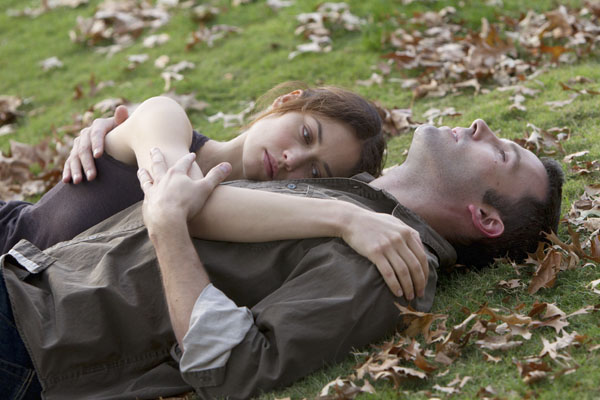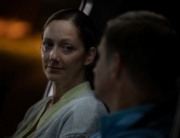To the Wonder is a surprise. Even with all of his hallmarks and impressionistic flourishes, Terrence Malick’s new film is very straightforward. It’s a love story about love stories—the beautiful, painful ones—with a plot that isn’t difficult to digest: Marina (Olga Kurylenko) meets an American tourist, Neil (Ben Affleck), in Paris, where she lives with her daughter, and the idea of falling in love dazzles him as much as it does her. They live inside their own romantic movie, at least at first, as their romance washes over the tourist attractions of France, and even her young daughter seems to promise him a new and full life. Neil takes up this opportunity gamely and hopefully. He returns to rural America with someone who looks like his wife and a child who could become his daughter. Then things fall apart. Marina’s visa expires, Neil refuses her pleads for marriage, and she returns to France. But the story is not the point.
As usual, voice-overs take the place of dialogue throughout—not narration but poetic non sequiturs from the characters. These often take the shape of conversations laid over other conversations or reflections whispered in silent moments. Malick exposes his characters’ disjointed lives by their thoughts, and all their grand statements begin to wither in comparison—these are lovers fumbling under hope and confusion. They are caricatures, or characters in only the strictest sense. They twitch with inaccessible sentience onscreen, and we wonder why.
A priest (Javier Bardem) in Neil’s mid-American town questions his devotion, silently to himself, and walks without purpose through his empty house and his sad, neglected town, dumbstruck at how much beauty the world promises but how little of God he can actually feel. Neil reunites with an old classmate, Jane (Rachel McAdams), and their encounter mirrors the same bell curve of shared hope and then the failure to connect as his previous relationship. Like Marina and Neil, the priest and Jane come across as beautiful puppets, transparently standing in for ideas. It’s easy to think about what Malick’s characters are doing, why they exist and fumble about, but it’s difficult to care or have empathy for them.
Yet Emmanuel Lubezki’s beautiful cinematography is hypnotic enough to be a reason to see this. Aided by a grand score that includes Wagner and Haydn, the fields of Neil’s Oklahoma hometown are gorgeous, huge and harsh and sunny, wide enough to think about the questions Malick poses. The setting seems to swallow his characters while still offering hints of something larger out there for them—a kind of happiness they can’t reach while they’re so busy drowning and grasping at each other for support.
The spaces in Neil’s prefab house are just as big. Lines of shadow and sunlight stretch across rooms without personality or even belongings. When Olga and her daughter move in with Neil, his house is a home physically but not emotionally—it’s more of a stage. The actors seem awkward inside it as a family that doesn’t quite fit. It’s either a testament to Affleck and Kurylenko or to Malick’s direction that their awkwardness feels like part of the point. They flounder painfully in silence, convincing as a couple who doesn’t know how to live together.
Ideas are beautifully connected, though not with subtlety and with too many emotional voice-overs in whispered French to sit through without a little contempt. And oh, how Marina twirls. How much can we watch her twirl? She dances with her daughter, runs through fields in sundresses, and spins around in Neil’s arms over and over again, trying to seduce him in a mimicry of spontaneity. He tries to imitate passion, and recognizing failure, they retreat to separate rooms in silence. The wordless repetition of all this futility is painful to watch. Even Lubezki’s graceful shots of hands holding hands and bison grazing in a field feel like overused trademarks of Malick’s sensibility, which can become exhausting after two hours of characters wasting away in misery. (There are none of The Tree of Life’s dinosaurs here.)
Still, the film is admirable and ambitious. It’s a strong attempt to paint emotional ideas that aren’t easy to articulate. It’s a visual study on the limits of love and fulfillment. It’s a tone poem about devotion. It is also apparently a stated semi-autobiographical story for the director, whose marriage to his French wife ended in 1998. You can read so much into it, and the film is fantastic if that challenge is worthwhile to you.

















Leave A Comment